Boris Akunin
ALL THE WORLDS A STAGE
The Further Adventures of Erast Fandorin
Translated from the Russian by Andrew Bromfield
Eight 1s
UNTIL THE BENEFIT PERFORMANCE
Erast Petrovich Fandorin began regarding himself as a harmonious man from the moment when he mounted the first rung on the ladder of wisdom. This event occurred neither too late nor too soon, but at precisely the right moment at an age when it is already time to draw conclusions, but it is still possible to change ones plans.
The most substantial conclusion drawn from the years he had already lived resolved itself into a supremely brief maxim that was worth all the philosophical teachings of the world taken together: growing older is good. Growing older signified maturing, that is, not deteriorating, but improving becoming stronger, wiser, more complete. If, as a man grew older, he had a feeling of impoverishment instead of enrichment, then his ship had wandered off course.
To continue the maritime metaphor, one might say that Fandorin had cruised past the reefs of the fifties, where men so often suffer shipwreck, under full sail and with his standard fluttering aloft in the breeze. The crew had very nearly mutinied, to be sure, but disaster had been avoided.
The attempted mutiny actually took place on his fiftieth birthday, which, of course, was no accident. There is an indisputable magic in the combination of figures that is not felt only by those who are totally devoid of imagination.
Having celebrated his birthday with a walk along the seabed in a diving suit (at that time Erast Petrovich was a passionate enthusiast of deep-sea diving), in the evening he sat on the veranda, watching the public stroll along the esplanade, sipping on his rum punch and mentally repeating to himself: I am fifty, I am fifty as if he were trying to get the taste of an unfamiliar drink. Suddenly his gaze fell on a decrepit little old man in a white panama hat, a desiccated, trembling mummy, who was being pushed along in a wheelchair by a mulatto servant. The gaze of this Methuselah was clouded and there was a thread of saliva dangling from his chin.
I hope I shall not live to that age, Fandorin thought and suddenly realised that he was frightened. And then he felt even more frightened by the fact that the thought of old age had frightened him.
His mood was ruined. He went back to his hotel room to tell his jade beads and paint the hieroglyph for old age on a sheet of paper. When the sheet had been covered with renderings of the symbol  in every possible style, the problem had resolved itself, a concept had been elaborated. The shipboard mutiny had been suppressed. Erast Petrovich had mastered the first stage of wisdom.
in every possible style, the problem had resolved itself, a concept had been elaborated. The shipboard mutiny had been suppressed. Erast Petrovich had mastered the first stage of wisdom.
Life could not be a descent, only an ascent right to the very final moment. That was one.
That much-quoted line by Pushkin Days follow days in flight, each day bearing off particles of being contained an error of logic. The poet had probably been in a melancholic mood, or it was simply a slip of the pen. The verse should have read: Days follow days in flight, each day bringing new particles of being. If a man lived correctly, the flow of time rendered him richer, not poorer. That was two.
Ageing should be a profitable transaction, a natural exchange of physical and mental strength for spiritual strength, of outward beauty for inner. That was three.
Everything depended on the quality of your wine. If it was cheap, age would sour it. If it was noble, it would only improve. The conclusion from this was: The older a man becomes, the more his quality must improve. That was four.
Oh, and there was a fifth point as well. Erast Petrovich had no intention of renouncing his physical and mental strength. And he devised a special programme to ensure that he wouldnt.
In each succeeding year of his life he had to conquer a new frontier. Actually two frontiers: a physical, sporting one and an intellectual one. Then growing old would not be frightening, but interesting.
A long-term plan for the prospective territorial expansion was drawn up quite rapidly a plan so ambitious that the next fifty years might not suffice.
Of his as yet unfulfilled goals in the intellectual line, Fandorin intended to achieve the following: at long last, learn the German language properly, since war with Germany and Austro-Hungary was obviously inevitable; master Chinese (one year was not enough for this, two would be required it would have been longer, but he already knew the hieroglyphs); fill a shameful lacuna in his knowledge of the world by familiarising himself thoroughly with the Moslem culture, for which he would have to learn Arabic and make a thorough study of the Koran in the original (set aside three years); read his way through classical and modern literature (Erast Petrovich had always found himself chronically short of time for this) and so on, and so forth.
His sporting goals, for the immediate future, included the following: learning to fly an aeroplane; devoting a year or so to an intriguing Olympic pastime useful for improving motor coordination pole-vaulting; taking up mountain-climbing; and, quite definitely, mastering skin-diving, using the new type of rebreather, in which the improved oxygen-supply regulator made it possible to dive to a significant depth for long periods. Agh, there was far too much to list everything!
In the five years that had passed since Fandorin had taken fright at his fright, the methodology of correct ageing had already produced quite decent results. Every year he had ascended one step higher or rather, two steps so that now he looked down on his former, fifty-year-old self.
By his fifty-first birthday, as an intellectual accomplishment, Erast Petrovich had learned the Spanish language, the lack of which he had felt so badly while cruising in the Caribbean. The step up for his body had been trick riding. Of course, he had ridden before, but not brilliantly, and this was a useful ability and in addition highly entertaining far more enjoyable than the automobile races of which he had grown so weary.
By the age of fifty-two Fandorin had learned to speak Italian and significantly improved his level of skill in kenjutsu Japanese swordsmanship. He had been taught this splendid science by the Japanese consul, Baron Shigeyama, a holder of the highest dan. By the end of the assigned period Erast Petrovich was winning two out of every three contests with the baron (and conceding one, but only in order not to offend his sensei).
The fifty-third year of Fandorins life was devoted, on the one hand, to classical and modern philosophy (unfortunately, his education had been limited to the grammar school); and on the other, to motorcycle riding, which, in terms of thrills, was in every way a match for equestrianism.
During the previous year of 1910, Erast Petrovichs mind had been occupied with chemistry, the most rapidly developing of modern sciences, and he had occupied his body with juggling (at first sight a trivial matter, mere foolish nonsense, but it fine-hones the synchronisation of movements and precise motor skills).
In the current season it had seemed logical to him to move on from juggling to tightrope walking an excellent means for consolidating ones physical and nervous equilibrium.
His intellectual exercises this year were also in part a continuation of the previous years enthusiasm for chemistry. Fandorin decided to devote this period of twelve months to an old passion criminalistic science. The appointed term had already expired, but the research continued, since it had taken an unexpected and highly promising direction, a line that apparently no one apart from Erast Petrovich was pursuing seriously.

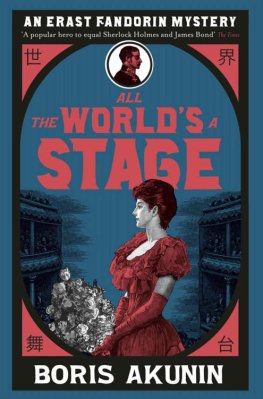
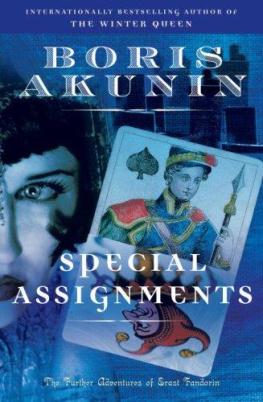
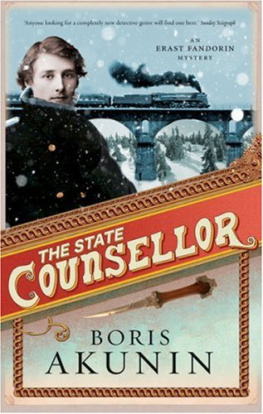
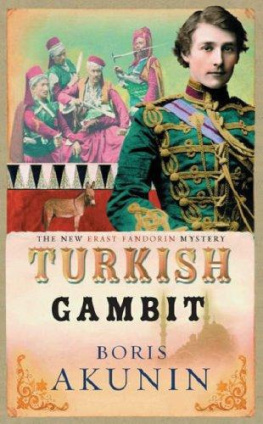
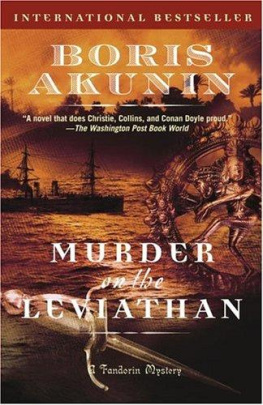
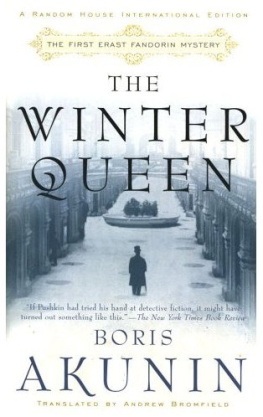



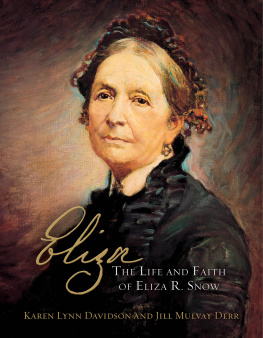




 in every possible style, the problem had resolved itself, a concept had been elaborated. The shipboard mutiny had been suppressed. Erast Petrovich had mastered the first stage of wisdom.
in every possible style, the problem had resolved itself, a concept had been elaborated. The shipboard mutiny had been suppressed. Erast Petrovich had mastered the first stage of wisdom.